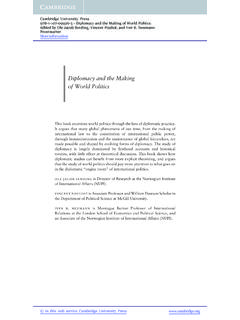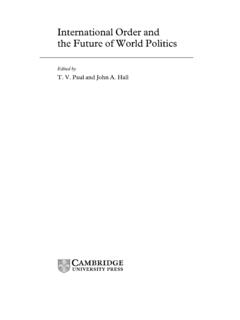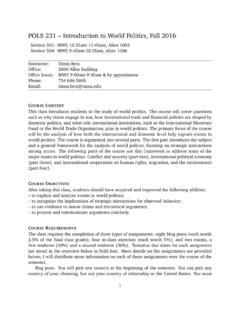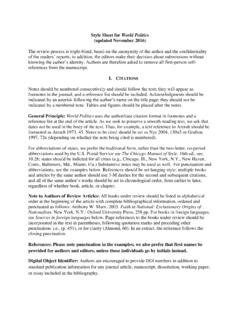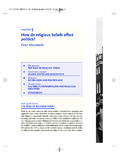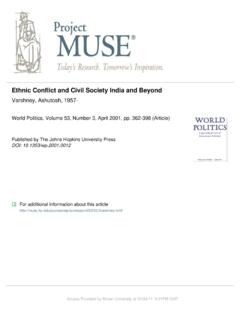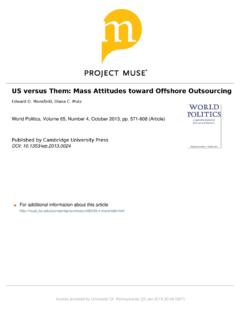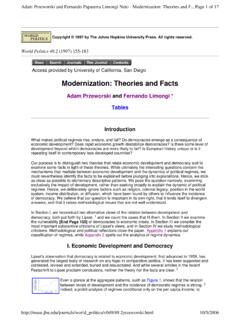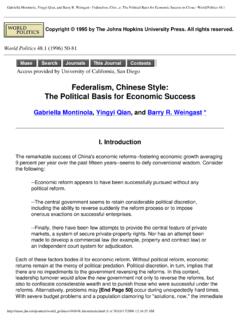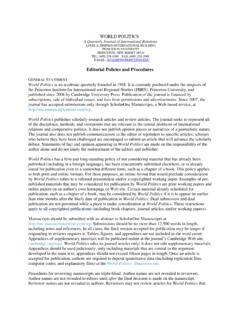Transcription of Hierarchy in International Relations: Authority ...
1 1 Hierarchy in International relations : Authority , sovereignty , and the New Structure of world Politics1 David A. Lake Department of Political Science University of California, San Diego La Jolla, CA 92093-0521 Revised: December 13, 2005 Abstract: Despite increasing attention, we lack the analytic tools necessary to understand International Hierarchy and its consequences for politics and policy. This is especially true for the informal hierarchies now found in world affairs. Rooted in a formal-legal tradition, International relationists almost universally assume that the International system is a realm of anarchy. Although the fact of anarchy remains a truism for the system as a whole, it is a fallacy of division to infer that all relationships within that system are anarchic. Building on an alternative view of relational Authority and recent research on the practice of sovereignty , a new conception of International Hierarchy is developed that varies along two continua defined by security and economic relations .
2 This construct is operationalized and validated, and then tested in a large-n study of the effects of International Hierarchy on the defense effort of countries. The principal finding is that states in hierarchical relationships spend significantly less on defense relative to GDP than states not in such relationships. In short, Hierarchy matters and subordination pays; states appear to trade some portion of their sovereignty for protection from external security threats. 1 Earlier versions of this paper were presented at the annual meetings of the American Political Science Association, Chicago, IL, September 2-5, 2004, and the Peace Sciences Society ( International ), Houston, TX, November 13-14, 2004. I am indebted to Susan Hyde for invaluable research assistance and Miles Kahler for numerous conversations inside and outside of the classroom on topics developed in this paper. Neither is implicated in any errors.
3 2 Hierarchy in International relations : Authority , sovereignty , and the New Structure of world politics The promise of American hegemony after the Cold War, the pressing problems of ethnic conflict and failed states, the war on terror, and the internationally divisive war in Iraq have focused new attention on Hierarchy in International relations . Recent events have resurrected a vocabulary of protectorates, dependencies, and even empires long forgotten in diplomatic discourse and now poorly understood by both policy makers and scholars alike. Writing in May 2003, Ivo Daalder and James Lindsey (2003) observed that the phrase American empire, which had virtually disappeared from common parlance, had appeared over 1,000 times in news stories in the previous six months. Though politically charged, the meaning of the term remains ambiguous. In responding to a question from the Arab newspaper al Jazeera asking if the Bush administration was bent on empire-building, for instance, Secretary of Defense Donald Rumsfeld simply denied the possibility, declaring We don t seek empires.
4 We re not imperialistic. We never have been. I can t imagine why you d even ask the question. On the very same day in a speech at the Council on Foreign relations , however, British economic historian Niall Ferguson took a diametrically opposed view. The great thing about the American empire is that so many Americans disbelieve in its existence, he stated. Americans, think they re so different that when they have bases in foreign territories, it s not an empire. When they invade sovereign territory, it s not an empire. Although these speakers have similar views on many aspects of American policy (see Ferguson 2004), their contrasting statements reveal a profound and widespread confusion over the nature of International Hierarchy , of which empire is merely an extreme form. This confusion exists, in part, because we lack the analytic tools necessary to understand International Hierarchy and its consequences for politics and policy.
5 This is especially true for the informal hierarchies now found in world affairs. International relationists almost universally assume that the International system is a realm of anarchy. This has placed blinders on inquiry. And although the fact of anarchy remains a truism for the system as a whole, it is a fallacy of division albeit one commonly made to 3infer that all relationships within that system are anarchic. As the debate over the new American empire suggests, Hierarchy does not stop at a nation s borders or, in that famous phrase of foreign policy, at the water s edge. Rather, if only we choose to see it, Hierarchy pervades relations between states and deeply affects their relations with one another. This article develops and tests a new approach to Hierarchy in International relations in four major sections, each building on the previous. First, I argue that the discipline of International relations imported from Max Weber, via Juristic theories of the state, a formal-legal conception of Authority that precludes, by definition, the possibility of Hierarchy between political units.
6 I pose an alternative, relational conception of Authority that allows us to see hierarchical relationships between states now hidden by the formal-legal approach. Second, although the principle of sovereignty assumes that the Hierarchy of Authority within states possesses a single apex terminating in the sovereign, recent research demonstrates that, in practice, there can be multiple apexes of Authority over any society, some of which culminate outside a given territorial realm. Building on this research, a relational approach to Authority opens the possibility of International hierarchies that do not take the form of traditional, Westphalian states. Third, I outline a conception of Hierarchy as variations in Authority exerted by a dominant actor over a subordinate party, and identify historically salient forms across the dimensions of security and economic relations . Operationalization of this concept is difficult and remains tentative, but we can map International Hierarchy in ways that appear conceptually valid.
7 Fourth, through a large-n test of the effect of Hierarchy on defense spending, I support a larger claim that understanding the role and pattern of Hierarchy in International politics is essential for explaining, interpreting, and ultimately making foreign policy. A relational conception of Authority expects dominant states to provide a stable social order for their subordinates. This implies that countries in Authority relationships with dominant powers should exert less defense effort (military spending as a proportion of GDP) than countries not in Authority relationships, all else constant. As predicted, Hierarchy is found to exert a statistically and substantively significant effect on military spending. 4 Together, these four themes point towards a new foundation that integrates Hierarchy into the core of International relations theory. In doing so, this new theoretical foundation erodes further the distinction between domestic and International politics , expands the scope of institutionalist theory in International relations , and suggests innovative avenues for research.
8 It also sheds important light on both the history of International politics and the role of the United States in the world today. Authority Anarchy is a political relationship in which the units possess no Authority over one another and are not bound under any common Authority (Waltz 1979). Hierarchy exists when one unit possesses Authority over a second, or both are bound by some third party. To understand this distinction, and the role it has assumed in International relations theory, requires that we revisit the concept of Authority and how a particular conception became enshrined into the discipline. In what is regarded as the paradigmatic definition, political Authority is commonly understood as a relationship in which B to follow A and B voluntarily complies (Scheppele and Soltan 1987). Two implications of this brief definition are noteworthy and deserve elaboration. First, for A to be authoritative, the several Bs who live within its jurisdiction must recognize an obligation to comply if possible with the laws or commands issued by A.
9 In an Authority relationship, the Bs recognize both that A has the right to issue certain commands and that they should, within the limits of their abilities, follow those commands. In short, the Bs accept A s commands as legitimate. Second, Authority is a form of power. Following Robert Dahl s (1957, 202) famous definition, power is the ability of A to get B to do something he or she would otherwise not do. In the case of Authority , B s behavior is driven by obligation, not force, but the operative condition is the same: B does something he or she would otherwise not do because of A s will. The commonly asserted opposition between power and Authority is, thus, ill-founded. Authority is a member of the larger class of power relationships. Many analysts, especially in International relations , equate power with the ability to coerce, a second form of power. Purely coercive relationships as when a mugger demands your money or your life are characterized by power, but are not authoritative.
10 Although it may be wise to comply in the face of 5superior force, there is no obligation to do so. It is the obligation to comply with A s commands or, alternatively, the legitimacy of those commands that renders Authority and coercion analytically Modern conceptions of Authority , including those in International relations , are given fullest expression in the work of Max Weber (1978, 215-26) who, in describing the modern bureaucratic state, developed an ideal type of formal-legal Authority . For Weber, and nearly everyone else since, A s ability to command the Bs, and the willingness of the Bs to comply, follows from the lawful position or office that A holds. In this conception, A possesses the right to issue laws and rules due to the office that A occupies, and not to any personal qualities that A may possess (Flathman 1980, 17). Authority does not inhere in A as a person, but in A as an officer. By analogy, Authority is law, and vice versa.
